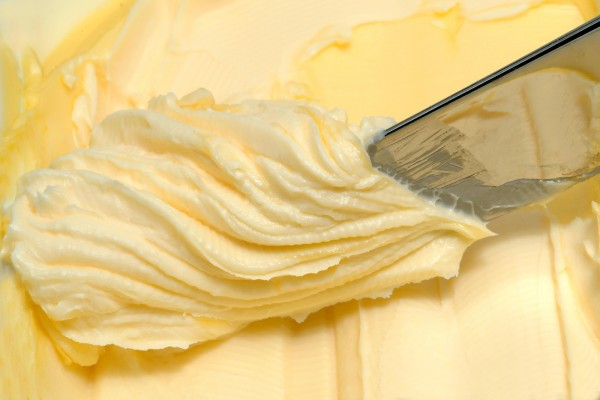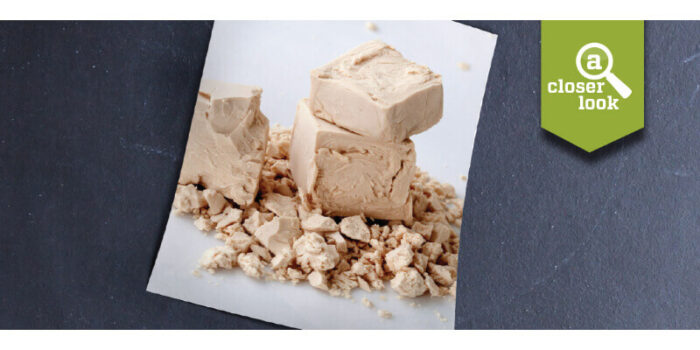It can be, but must bear a reliable Kosher symbol.
See over 1600 dairy butter products certified OK Kosher
About butter and Kosher
The following is adapted from an in-depth essay by Rabbi Don Yoel Levy, OK Kosher President / Rabbinic Administrator
For a long time, kashrus agencies considered butter a Group One ingredient—a category applying to products that are kosher without supervision. However, ongoing developments in food production have introduced many kashrus concerns, invalidating common assumptions.
Kosher agencies and consumers commonly believed that butter presented no kashrus concerns because butter can only be made from the milk of a kosher animal (the milk of a non-kosher animal will not congeal). But, food production methods have developed greatly and the above logic is no longer reliable.
What is butter?
Butter is mostly butterfat with the addition of milk elements and water. It was traditionally made from sweet cream (commonly called heavy cream), the thick layer skimmed off the top of milk. Sweet cream contains both butterfat and buttermilk. A churning action causes butterfat lumps to bond together into balls of butter, while the buttermilk separates.
If butter was still made with only this cream and perhaps some salt and water, we could continue to classify butter in Group One; however, it is not.
What commercial butter is made from
The primary kashrus issue concerning butter is that whey cream is often added to it. Whey cream is a byproduct of cheese manufacturing. When milk is curdled to make cheese, it separates into two parts: the mass that will become the cheese and a watery compound called whey, part of which is cream.
Commercial companies seek to monetize every aspect of their production; nothing is discarded if it can be used in some way. When it was discovered that whey cream can be made into butter, cheese companies began selling their whey cream to butter companies.
Why would a butter company add whey cream to its products? The answer again is economics; whey cream is less expensive than sweet cream. If a company can successfully make butter by using whey cream, the company stands to save money.
Why Cheese is not inherently kosher
Cheese needs kosher supervision for two reasons. First, all ingredients in cheese, including the rennet (the curdling mechanism) used to set the cheese, must come from a kosher source (either microbial, genetically engineered, or a properly slaughtered animal). The starter culture also must be kosher, as must any additives that enhance the flavor.
At the OK, if cheese is made from non-kosher ingredients, we treat the whey as not kosher as well. (It should be noted that the Halachic authority Rabbi Moshe Feinstein, zt’l, considered this whey kosher. However, because of complexities in using whey that is made in this fashion, the major kashrus agencies do not permit the use of whey from non-kosher cheese.)
The second kashrus issue concerns gevinas akum, the kosher law that requires a Jewish person’s participation in the production of kosher cheese. Swiss cheese is the most common example of a cooked cheese, produced by heating the curd and whey at or above 120°F. In this scenario, some hold the taste of gevinas akum has been absorbed into the whey. The prevailing view among kashrus agencies is to be strict with this whey as well. Therefore, if a Jew did not participate in the cheese production, we will not certify the whey or whey cream byproduct.
One can argue that there is room for leniency with Swiss cheeses, because the whey separates from the cheese before the cheese-making process is completed. At this earlier stage, one can make the case that the rule of gevinas akum is not invoked, but that is not the prevailing view.
But an additional serious concern arises with some Italian cheeses such as mozzarella, which are processed differently. After these cheeses are finished, they are cooked in water at 165°F to make them malleable. (This is how you get the “stretching” quality of cheese used for pizza.) During the cooking process, the taste of gevinas akum is absorbed into the water which also contains whey cream. Many mozzarella cheese-makers sell the whey cream that is extracted from this cooking water. Consequently, the presence of this whey cream in butter will render the butter not kosher.
Currently the OK does not certify any butter plants in which non-kosher whey cream is used in any fashion. Therefore, this co-mingling of cream is not an issue with OK-certified products, but it remains an general issue for the consumer in uncertified butter.


 EN
EN  ZH
ZH  KR
KR  BR
BR  ES
ES  IN
IN  IL
IL 




